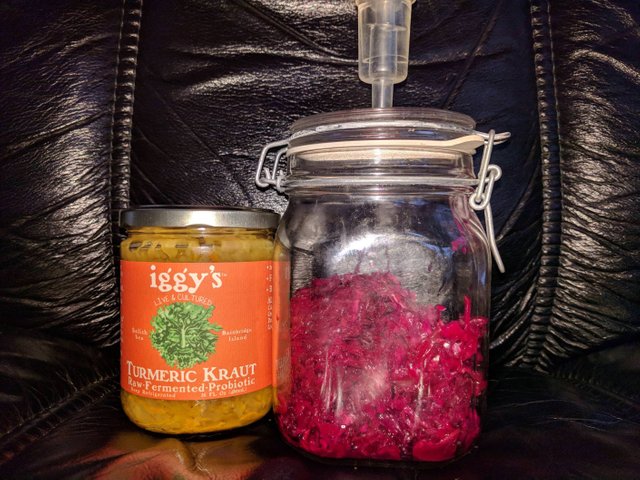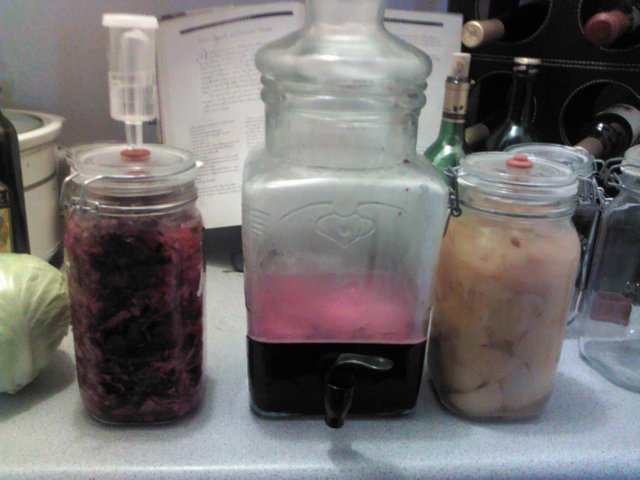Food: Science Picture Challenge #2: The Science of Sauerkraut and Kim Chi
Everyone knows about alcohol fermentation, but did you know that you can ferment a lot of different foods? One of those foods is cabbage, and the magical end result of the fermentation of cabbage is, you guessed it, sauerkraut or Kim Chi.

Home Made and Store Bought Sauerkraut
Image is my own
Fermentation of foods occur when specific microorganisms are matched up with the right food. Instead of rotting, you get a wonderful result that is often more digestible than the original food. In the case of sauerkraut, finding the right organism for fermentation is easy because the specific bacterial cultures needed for proper fermentation occur naturally in the cabbage (1).

Left to right: homemade sauerkraut with air loc,
beet kvass, and preserved lemons.
Image is my own
The right bacteria is why fermenting sauerkraut doesn't give us alcohol. To make alcohol, it requires yeast whose waste products are alcohol, but with sauerkraut, the lactobacillis bacteria from the sauerkraut create lactic acid as their waste products.
Give the microorganisms a bit of moisture, the right pH, enough salt to keep bad bacteria from proliferating at the beginning, an environment without oxygen (just make sure the cabbage is underwater) and a bit of time, and sauerkraut is inevitable! The lactic acid waste products also create an acidic environment that inhibit the colonization by bacteria that might be harmful for us (2). Eat the bacteria and that provides the gastrointestinal tract with healthy probiotic bacteria (3) . No need to take probiotics when you can just make them yourself.
(1) Impact of low salt concentration, salt quality on natural large-scale sauerkraut fermentation
(2) Probiotic bacteria in fermented foods: product characteristics and starter organisms
(3) The New Lifestyle: A Threat to Health?
Wow, I'm not sure what I think about sauerkraut, but if it's good for my gut, maybe it's an acquired taste and I'll give it a try. I do like it on my hot dogs and sausages once in a while though so maybe I'll try it more often. Since I'm of German descent, maybe my genetics will teach me to like it.
Wow !!!! you made sauerkraut yourself !!! OMG!!!
I didn't know the lactic acid contribute to the taste of it!! Nice entry!
don't forget to leave your entry in the comment session of the original post!
Thanks for reminding me! And yes, I make my own sauerkraut and lots of other fermented things. It's actually quite simple and usually needs no attention at all.
Interesting article!
Kim Chi is Japanese in origin and Sauerkraut is German, I'm surprised the Irish didn't come up with one of those recipes. I wonder if they have their own version.
One can ferment potatoes (2-3 days in salt water and anarobic environment), this article says it makes the taste/texture better, but cooking obviously kills the probiotics.
http://phickle.com/roastedpotatoes/
Huh, well I think I'd take taste/texture over probiotics any day. I've got enough bacteria as it is.
Just polished of a small bowl of Kim-chi this evening. It's almost seems counterintuitive to eat spicy, fermented cabage to aid digestion. It does wonders though. And it tastes great.
Nice dear
Congratulations. This post is featured in the week's nunesso's Curation post for the Nutrition and Natural Products industry. You have received a 100% upvote from us.
https://steemit.com/natural-products/@nunesso/weekly-nunesso-natural-products-curation-2
Hola muy buen post, te invito a pasar por mi blog y leer mi ultimo post el embarazo se contagia !! @amirjv1 saludos